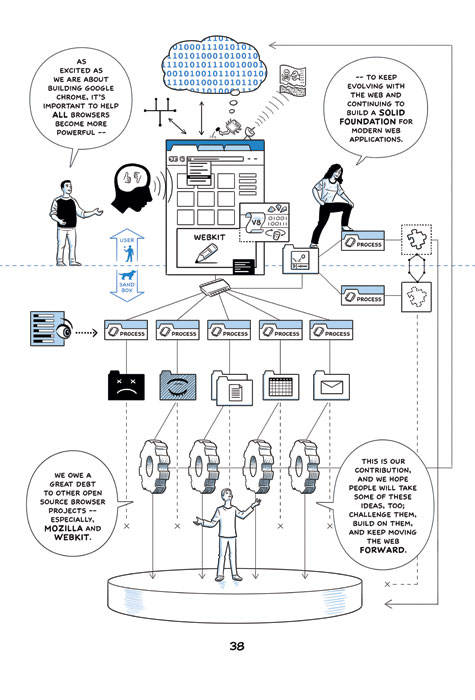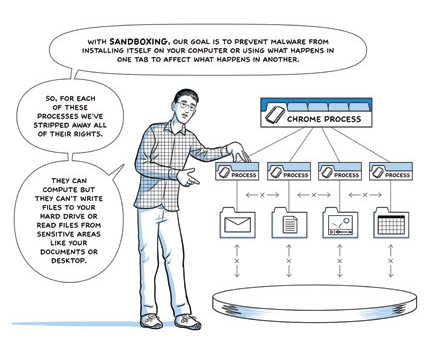| Chrome 10 Years Old - And It Seems A Lot Older |
| Written by Ian Elliot | |||
| Monday, 03 September 2018 | |||
|
Chrome is just ten years old this week and what a change 10 years has brought about. It changed the browser landscape beyond recognition and it also provides an example of how software loses its youthful vigor.
Back before Chrome, the browser world was dominated by Internet Explorer with a side order of Firefox - with, of course Safari on Apple hardware. Microsoft more or less did its own thing and Firefox tried to keep up and gain some control. What motivated Google to create a browser is not hard to understand. When your core business relies on browsers using your search engine as default, why not ensure that this is the case by making the browser. The Chrome team decided to use Apple's open source WebKit rendering engine as the basis for its new project. It is interesting to speculate what Chrome might look like today had Firefox been chosen instead. One reason why Firefox was disregarded was that it was built using a very strange and advanced architecture - one that is in the process of being abandoned in favor of a more standard approach like that of WebKit. When Chrome first appeared on the scene, it was a Windows-only beta and it took another year before it moved to Linux and MacOS. Users and developers alike were looking for an alternative to the quirky Internet Explorer and Chrome was greeted with some enthusiasm, but it was Firefox that was picking up the new users. Chrome started out as the plucky underdog and it was strongly standards based and placed emphasis on being fast and efficient. It made Internet Explorer and Firefox look bloated. How things change. Much of Chrome's advantage was due to it being a new project. We all know the feeling of starting a fresh page and making the code lean. Even so, Chrome did not just win hands down and Google had to support Firefox with a marketing deal - Firefox got cash and Google got to be the default search engine. Slowly but surely, Chrome overtook Firefox. Partly because Chrome was the default browser on Android and partly because Firefox just didn't keep up. Eventually Chrome use grew to the over 60% market share and pushed both Firefox and Internet Explorer almost into a minority user position. Since then both Microsoft and Mozilla have been fighting back. Microsoft scrapped Explorer and started a new browser project - Edge - which benefited from the new project effect and is seen as being lean but not completely formed. The big surprise is that Firefox is making a come back of sorts. Mozilla decided to give up on its original architecture and re-engineer Firefox to be fast and efficient, and it seems to have worked. So it can be done without throwing everything out and starting again - although when you look closely that seems to be the overall effect! Google and the Chrome team make use of their position as the 200-pound gorilla to just get on with standards that suit them and back peddle on others. The idea that Chrome IS the standard is a message that you can't ignore and in this sense Chrome has taken over the position of Internet Explorer - works best in Chrome. The irony is that in ten years Chrome has grown fat. It uses lots and lots of memory with just a few tabs open and slows to a crawl as it strangles itself with its memory demands. What of the next ten years? It is true to say that any sufficienly advanced browser is indistigushable from an operating system. In the case of Chrome it is an operating system - well if you ignore the Linux kernel lurking under the bonnet of Chrome OS. Chrome needs an overhaul like Firefox got, both to serve as a browser and to form the UI of an operating system. Perhaps start a rewrite in Go project?
More InformationRelated ArticlesFirefox Share Below 10 Percent Firefox Quantum - Fast For Good Chrome 61 Ready To Introduce New Features Firefox Losing Share As Desktop Browser
To be informed about new articles on I Programmer, sign up for our weekly newsletter, subscribe to the RSS feed and follow us on Twitter, Facebook or Linkedin.
Comments
or email your comment to: comments@i-programmer.info
|
|||
| Last Updated ( Monday, 03 September 2018 ) |


 Now we have a mature Chrome and many don't like it.
Now we have a mature Chrome and many don't like it.

